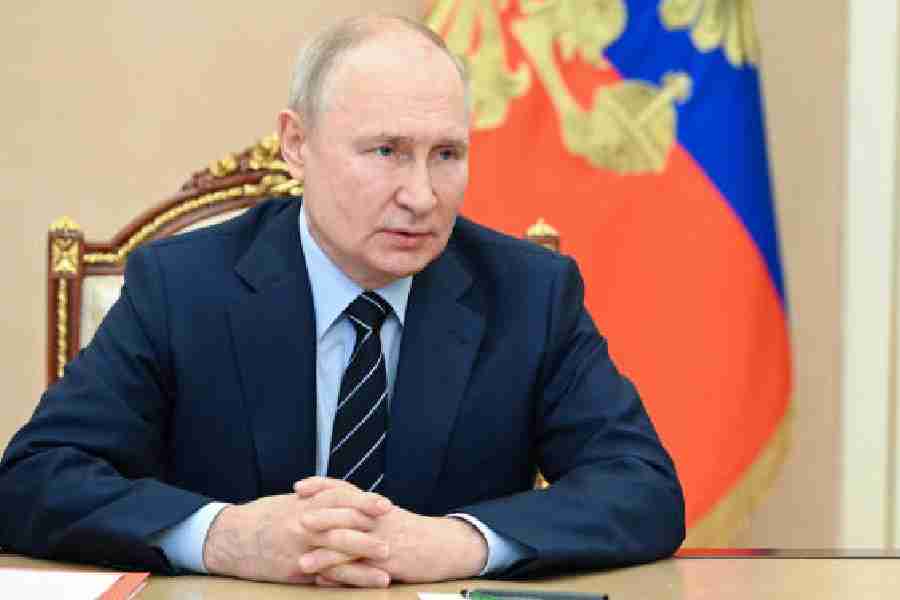Just as the news broke on Wednesday of the presumed death of the mercenary chief Yevgeny V. Prigozhin, President Vladimir V. Putin of Russia was presiding over a World War II anniversary ceremony on a dark stage lit dramatically in red.
He held a moment of silence, flanked by service members in dress uniforms, while a metronome’s beats sounded, like the slow ticking of a clock: Tock. Tock. Tock.
The eerie split screen — the reported fiery demise of the man who launched an armed rebellion in June and the Russian President telegraphing the state’s military might — may have been coincidental. But it underscored the imagery of dominance and power that Putin appears more determined than ever to project.
Prigozhin may have been brutally effective, throwing tens of thousands of his fighters into the maw of the battle for Bakhmut in eastern Ukraine, tying up Ukrainian forces in the process and hobbling Kyiv’s ability to stage a counteroffensive. His Internet “troll farm” helped the Kremlin interfere in the 2016 American presidential election, while his mercenary empire helped Russia exert influence across Africa and West Asia.
But with his June rebellion, Prigozhin threatened something even more sensitive: Putin’s own hold on power. After the crash of Prigozhin’s plane on Wednesday, the Kremlin appears to be sending the message that no degree of effectiveness and achievement can protect someone from punishment for violating Putin’s loyalty.
“Everyone’s afraid,” Konstantin Remchukov, a Moscow newspaper editor with ties to the Kremlin, said of the reaction among the Russian elite.
Never before has someone so central to Russia’s ruling establishment been killed in a suspected state-sponsored assassination, said Mikhail Vinogradov, a Moscow political analyst.
“This is a rather harsh precedent,” Vinogradov said, adding that the Kremlin appeared to be doing little to dissuade Russians of the view that it had sanctioned Prigozhin’s killing. After all, if members of the ruling elite concluded that one of the Putin system’s most powerful players had been killed against the Kremlin’s wishes, it would send a devastating signal of Putin’s loss of control.
Dmitri S. Peskov, the Kremlin spokesman, said on Friday that the suggestion by foreign officials that the Kremlin was behind Prigozhin’s death was an “absolute lie”.
To some, the fact that Prigozhin was able to survive for two months after staging his rebellion was more surprising than the crash of his private jet. In an address to the nation on June 24, as Prigozhin’s forces were marching on Moscow and already in control of a city of a million people in Russia’s southwest, Putin accused the warlord of “betrayal”.
And betrayal, Putin has said previously, is the one act that cannot be forgiven. So when Putin appeared to strike a deal with Prigozhin allowing him to retreat safely to Belarus, the act struck some Russians as a sign of the President losing control. The view was magnified when photographs surfaced of Prigozhin meeting with African officials on the sidelines of Putin’s marquee summit with African leaders in St Petersburg in July.
“After he ‘forgave’ Prigozhin, it was understood by those around him as weakness,” said Aleksei A. Venediktov, who headed the liberal Echo of Moscow radio station before the Kremlin shut it down last year.
Venediktov, in an interview in Moscow on Thursday, argued that Prigozhin’s apparent death had strengthened Putin’s dominance in the Russian political system after the chaos of the rebellion. Now, “Putin has shown his elite,” Venediktov went on, that “any betrayal will be found out”.
US officials are certain that Prigozhin was killed in the crash, and that Putin ordered the killing. But when it comes to the power dynamics inside Russia’s elite, whether Putin personally ordered the attack may be beside the point: What matters is that Prigozhin suffered a violent end after Putin publicly condemned him.










